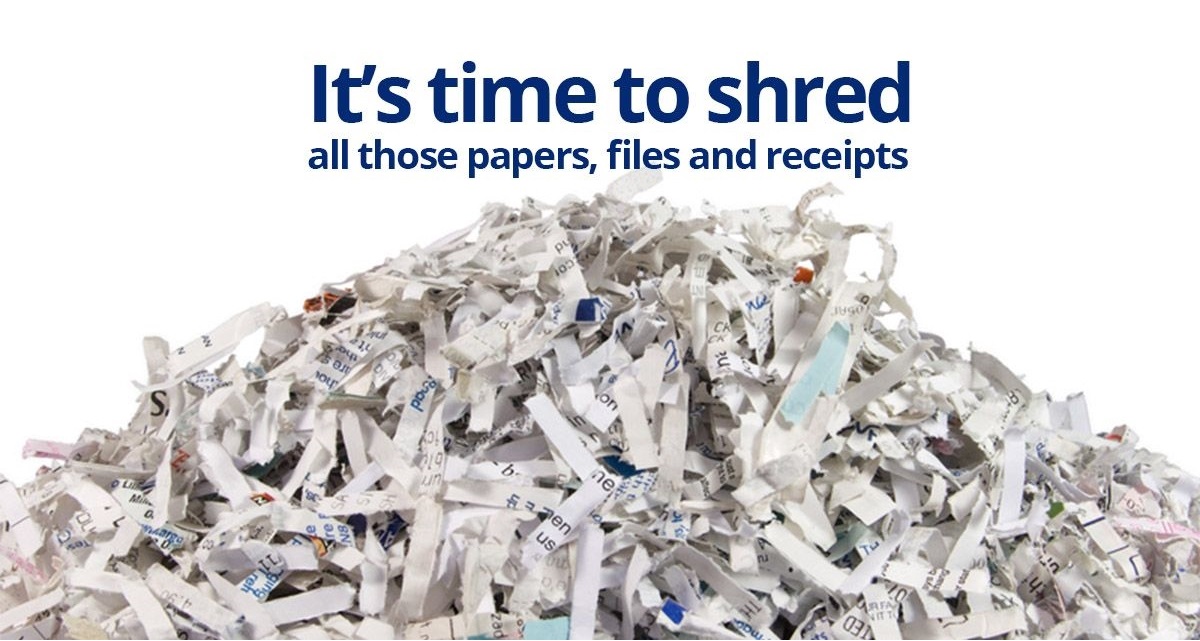Date/Time: 4/25/2024 1:22 pm
Subject: Computer Club Shred-it Day REMINDER

REMINDER: Shred Day
The Computer Club is sponsoring a shred day for all Computer Club members.
Saturday, April 27th
9-Noon, OR until truck is full
Cowan Creek Pavilion Parking Lot (not Legacy Hills)
Rules:
- Legal documents, bank statements, documents containing private information.
- No metal, plastic, books, magazines, catalogs.
- Small paper clips and staples are acceptable.
- 2 boxes or 2 grocery bags - no more than 20 pounds.
- No plastic bags.
- Containers will be returned to the member.
- Stay in your vehicle - a volunteer will unload your containers.
There are still spots available. To sign up click this link: signupgenius.com
- Click on "Sign Up"
- Click on "Save and Continue"
- Enter your name and email address
- Click on "Sign Up Now"
You will receive a confirmation email immediately.
You will receive a Reminder email 2 days before the event.
Here's an article that a club member found that may be useful for determining what to keep and what to shred:
Keep these 10 financial documents forever. Scan and shred the rest.
Always hold onto birth certificates and Social Security cards.
Sometimes we hold onto all that paper because we aren’t sure what to keep and what to toss. Here’s a rundown of what should be retained.
Forever documents:
Certain papers should be kept in a safe location where they are protected from damage, loss and theft. Such original documents, which may be hard or costly to replace, include:
•Birth certificates and adoption papers
•Death certificates
•Marriage and divorce records
•Social Security cards. Yes, you know the number, but there may be an occasion where you have to produce the actual card.
•Military service records, including discharge documents. An honorably discharged service member is eligible to receive funeral and burial benefits.
•Loan payoff statements. Here’s something important: If you negotiated to pay less than what you owed on a debt, keep the original agreement in perpetuity. Often when debt is sold to debt collectors for pennies on the dollar, the sale doesn’t include a lot of information, including documentation proving a payoff.
• Year-end pay stubs. If a company goes out of business you may not be able to track down the information should you need it later.
• Retirement or pension records. Be sure to keep the records from previous jobs.
•Estate documents
•Funeral programs. Although many funeral homes will post an obituary online, they are often shortened versions of the program you might receive at the service. They contain a wealth of information that can be helpful in estate planning, including maiden names and other family history you might need. (In this case, I like keeping the originals rather than a scanned version.)
•Loan documents: Keep original loan documents and statements until you have paid off the loan. Then, save the paperwork verifying the balance was paid in full.
• Vehicle title: Keep the original as long as you own the vehicle.
• Receipts for big-ticket items: For insurance purposes, in case of fire or theft, save receipts for big-screen TVs, computers and other major purchases. Hold on to each receipt as long as you own the item. A scanned copy should be fine.
•Home improvement purchase orders, receipts, canceled checks: Keep proof of any upgrades until you sell the home. If you have a capital gain from selling your primary home, you may qualify to exclude as much as $250,000 from your income or as much as $500,000 if you file a joint return with your spouse. If you exceed these limits, here’s where having proof of the capital improvements helps your tax situation: “When you make a home improvement, such as installing central air conditioning or replacing the roof, you can’t deduct the cost in the year you spend the money,” according to TurboTax. “But, if you keep track of those expenses, they may help you reduce your taxes in the year you sell your house.”
•Investment statements: If they are available online, you do not need paper copies. The most important reason to maintain these records would be to establish your cost basis when selling an asset to make sure you claim the proper capital gain or loss on your tax return.
3 to 7 years
•Tax records: Record-keeping guidelines are tied to statutes of limitations. That’s generally three years, but it’s seven years for worthless securities and bad debts, according to IRS spokesman Eric Smith. “For most people, the tax-related statute of limitations is pretty straightforward,” he said. But there are special circumstances that extend that time. For example, getting a tax filing extension, serving in a combat zone, qualifying for a disaster area deadline postponement or a financial disability.
• You must keep records, such as receipts, canceled checks and other documents that support an item of income, a deduction or a credit appearing on a return, according to the IRS. But it doesn’t have to be an original. Scan and shred. The agency will accept a legible digital copy of a document.“Electronic storage is also fine, as long as they can be retrieved, if needed,” Smith said. Why keep even a scanned version after several years? Your past returns contain your financial history — employment, investments and charitable giving choices. But you won’t have to worry about having a scanned copy if you have an IRS online account. With an account, you can access a transcript of your return. Maintaining years of tax returns can help if you ever need to research payments made into Social Security.
•Medical bills: If you paid a medical expense with your health savings or flexible spending account, keep the receipt for three years. Consider it a tax-related document.
1 year
•Credit card statements: Companies will provide you with a year-end statement that categorizes all expenses. If that works for you, shred the monthly statements you may have been getting in the mail. And if you’re still getting paper statements, stop. Get them e-delivered.
Less than a year
There is no need to keep all those ATM or retail receipts. Once you get your statements, you can shred and toss.
Word of caution
Be sure to research online services that will backup your scanned documents. By the way, an external hard drive attached to your
computer is still vulnerable to hackers.
Make sure you also regularly update your computer software.
